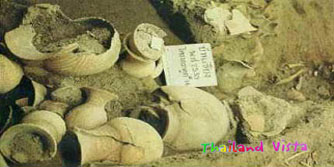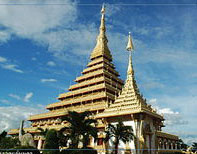
|
Thailand Hotel and Resort Reservation_Thailand Hotel and Resort Reservation Thailand History Recent archaeological discoveries around the northeast hamlet of Ban Chiang suggest that the world's oldest Bronze Age civilization was flourishing in Thailand some 5,600 years ago.
Successive waves of immigrants, including Mons, Khmers and Thais, gradually entered the land mass now known as Thailand, most slowly travelling along fertile river valleys from southern China. By the 11th and 12th centuries, Khmers ruled much of the area from Angkor. By the early 1200s, Thais had established small northern city states in Lanna, Phayao and Sukhothai. In 1238, two Thai chieftains rebelled against Khmer suzerainty and established the first truly independent Thai kingdom in Sukhothai (literally, "Dawn of Happiness"). Sukhothai saw the Thais' gradual expansion throughout the entire Chao Phraya River basin, the establishment of Theravada Buddhism as the paramount Thai religion, the creation of the Thai alphabet and the first expression of nascent Thai art forms, including painting, sculpture, architecture and literature. Sukhothai declined during the 1300s and eventually became a vassal state of Ayutthaya, a dynamic young kingdom further south in the Chao Phraya River valley. Founded in 1350, Ayutthaya remained the Thai capital until 1767 when it was destroyed by invaders.
Two Chakri monarchs, Mongkut (Rama IV) who reigned between 1851 and 1868, and his son Chulalongkorn (Rama V, 1868-1910) saved Thailand from western colonisation through adroit diplomacy and selective modernisation. Today, Thailand is a constitutional monarchy. Since 1932, Thai kings, including the present monarch, H.M. King Bhumibol Adulyadej (Rama IX), have exercised their legislative powers through a national assembly, their executive powers through a cabinet headed by a prime minister, and their judicial powers through the law courts.
Recommend Chiangmai Hotels:
|
|
Thailandvista.com is registered with the Department of Business Development, Ministry of Commerce, Thailand. Travel information refers from Tourism Authority of Thailand and other sources
Thailand Hotel Booking Engine Powered by Co-Branded R24
 |




